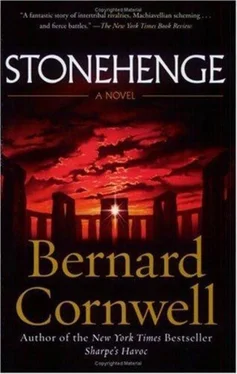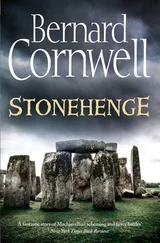1 ...5 6 7 9 10 11 ...111 'Fetch him!' Neel shouted. His hands were clutched to his groin and he was rocking back and forward to contain the agony.
'Let him be,' Galeth said.
'Hirac wants him!' Neel insisted.
'Then let Hirac fetch him,' Galeth retorted angrily. 'And go. Go!' He drove the injured priest from the temple's cleared centre, then crouched beside the hazels where the strange creature had vanished. 'Camaban?' Galeth called into the leaves. 'Camaban?' There was no answer. 'I'm not going to hurt you.'
'Everyone hurts m-m-me,' Camaban said from deep in the bushes.
'I don't,' Galeth said, 'you know I don't.' There was a pause and then Camaban appeared nervously from deep inside the hazel thicket. His face was long and thin, with a prominent jaw and large green eyes that were wary. 'Come and talk to me,' said Galeth, retreating to the centre of the clearing. 'I won't hurt you. I've never hurt you.'
Camaban crept forward on hands and feet. He could stand, he could even walk, but his gait was grotesquely dipping since he had been born with a clubbed left foot, for which reason he had been named Camaban. The name meant Crooked Child, though most of the tribe's children called him Pig, or worse. He was Hengall's second son, but Hengall had disowned him and banished him from Ratharryn's walls, dooming the child to scavenge a living among the folk who lived beyond the great embankment. Camaban had been ten when he was cast out, and that had been four summers before, and many marvelled that Camaban had lived since his banishment. Most cripples died very young, or else were chosen to die for the gods, but Camaban had survived. By now, if he had not been a cripple and an outcast, he would have taken the ordeals of manhood, but the tribe would not take him as a man so he was still a child, the crooked child.
Hengall would have preferred to kill Camaban at birth because a crippled son was a disastrous omen, worse than a daughter, but the boy had been born with the red mark on his belly and the mark was shaped like a crescent moon and Hirac had declared that the baby was marked by Lahanna. The child might yet walk, the high priest had said, so give him time. Camaban's mother had also begged for his life. She had then been Hengall's oldest wife and had been barren for so long that it was thought she would never give birth. She had prayed to Lahanna, as all childless women do, and she had made a pilgrimage to Cathallo where Sannas, the sorceress, had given her herbs to eat and made her lie one full night wrapped in the bloody pelt of a newly killed wolf. Camaban came nine moons later, but was born crooked. His mother pleaded for him, but it was the moon mark on Camaban's belly that persuaded Hengall to spare the boy. Camaban's mother never had another child, but she had loved her wolf-son and when she died Camaban had wailed like an orphaned cub. Hen-gall had struck his son to silence and then, in disgust, had ordered that the cripple be cast outside Ratharryn's wall.
'Are you hungry?' Galeth now asked the boy. 'I know you can talk,' he said after waiting for an answer, 'you talked just now! Are you hungry?'
'I'm always hungry,' Camaban answered, peering suspiciously from under his tangle of matted hair.
'I'll have Lidda bring you food,' Galeth said. 'But where should she leave it?'
'B-b-by the river,' Camaban said, 'where Hirac's son died.' Everyone knew that benighted place downstream from the settlement. The high priest's child had drowned there, and now a sloe bush, which Hirac claimed was his son's spirit, grew among the alders and willow.
'Not here?' Galeth asked.
'This is secret!' Camaban said fiercely, then pointed up to the sky. 'Look!' he said excitedly. Galeth looked and saw nothing. 'The p-p-post!' Camaban stuttered. 'The p-post.'
Galeth looked again. 'The post?' he asked, then remembered that there had been one post of the death house left in the Old Temple. It had been a familiar enough landmark, jutting and leaning from the clump of hazels, but now it was broken. The lower half was still planted in the earth, but the upper part lay charred and shattered among the undergrowth. 'It was struck by lightning,' Galeth said.
'Slaol,' Camaban said.
'Not Slaol,' Galeth said, 'Rannos.' Rannos was the god of lightning.
'Slaol!' Camaban insisted angrily. 'Slaol!'
'All right! Slaol,' Galeth said good-naturedly. He looked down at the wild-haired boy, whose face was contorted with rage. 'And what do you know of Slaol?'
'He t-t-talks to me,' Camaban said.
Galeth touched his groin to deflect the god's displeasure. 'Talks to you?'
'All night sometimes,' Camaban said. 'And he was angry because L-L-Lengar came back and t-t-took the treasure away. It's Slaol's treasure, see?' He said this last very earnestly.
'How do you know Lengar took the treasure?' Galeth asked.
'B-b-because I watched him! I was here! He t-t-tried to kill Saban and didn't see me. I was in here.' Camaban twisted round to burrow back into the hazel bushes. Galeth followed, crawling down a passage that had been trampled through the weeds to where Camaban had woven supple branches together into a living hut. 'Here's where I live,' Camaban said, staring defiantly at his uncle. 'I'm the g-g-guardian of the temple.'
Galeth could have cried for pity at the boy's pathetic boast. Camaban's bed was a pile of soaking bracken, beside which lay his few belongings: a fox's skull, a broken pot and a raven's wing. His only clothing was a rotting sheep's pelt that stank like a tanner's pit. 'So no one knows that you live here?' Galeth asked.
'Only you,' the boy said trustingly. 'I haven't even t-t-told Saban. He brings me food sometimes, b-b-but I make him take it to the river.'
'Saban brings you food?' Galeth asked, surprised and pleased. 'And you say Slaol talks to you here?'
'Every d-d-day,' Camaban stuttered.
Galeth smiled at that nonsense, but Camaban did not see for he had turned and reached further into the leaves where, from a hiding place, he brought out a short bow. It was an Outfolk bow, the stranger's bow with its wrappings of sinew lashed about the strips of wood and antler. 'L-L-Lengar used it last night,' Camaban said. 'The m-m-man was d-d-dying anyway.' He paused, looking worried. 'Why does H-H-Hirac want me?' he asked.
Galeth hesitated. He did not want to say that Camaban was to be sacrificed, though there could be no other reason for Hirac's demand.
'He wants to k-k-kill me,' Camaban said calmly, 'doesn't he?'
Galeth nodded reluctantly. He wanted to tell his outcast nephew to run away, to go west or south into the woods, but what good would such advice do? The child would die anyway, caught by beasts or captured by slavers, and it would be better if he were given to Lahanna. 'You will go to the goddess, Camaban,' Galeth said, 'and you'll become a star and will look down on us.'
'When?' Camaban asked, seemingly unmoved by his uncle's promise.
'Tomorrow, I think.'
The boy gave Galeth a mischievous grin. 'You c-c-can tell Hirac that I'll b-b-be at Ratharryn in the morning.' He turned to push the precious bow back into its hiding place. Other things were concealed there: the stranger's empty quiver, a snake's skin, the bones of a murdered child, more bones that had small marks scratched on their flanks and, most precious of all, two of the small golden lozenges that Camaban had retrieved while Lengar had pursued Saban. Now he took those lozenges and held them tight in his fist, but did not show them to Galeth. 'You think I'm a fool,' he asked, 'don't you?'
'No,' Galeth said.
'B-b-but I am,' Camaban said. He was Slaol's fool, and he dreamed dreams.
But no one took any notice, for he was crippled. So they would kill him.
—«»—«»—«»—
Next morning Neel had two men dig a shallow grave in Lahanna's temple, just beside the outer ring of poles. It was, the men agreed, an auspicious day for the sacrifice for the clouds that had trailed the storm were thinning fast and Lahanna was showing her pale face in Slaol's sky. A few darker clouds appeared as the crowd gathered about the temple's five rings and some feared that Hirac would delay the sacrifice, but he must not have been concerned about the clouds for at last the dancers appeared from the high priest's hut. The dancers were women who carried leafy ash branches with which they swept the ground as they capered ahead of the seven priests whose naked bodies had been whitened with the slurry of chalk in which finger patterns swirled. Hirac wore a pair of antlers tied to his head with leather laces and the horns tossed dangerously as he danced behind the women. A ring of bones circled his waist, more bones hung from his mud-crusted hair, and a shining talisman of amber dangled at his neck. Neel, the youngest priest, played a flute made from the leg bone of a swan and its notes skittered wildly as he danced. Gilan, who was next oldest after Hirac, led Camaban by the hand. The boy had been allowed back into Ratharryn for this one day, and while he was inside the embankment the women had woven flowers into his black hair that had been untangled with bone combs so that it now fell straight to his thin waist. He too was naked, and his washed skin looked unnaturally clean. The red mark of Lahanna showed on his flat belly. Like Hengall's other two sons he was tall, though each time he stepped on his left foot his whole body made a grotesque twisting dip. Hengall and the tribe's elders followed the priests.
Читать дальше
Конец ознакомительного отрывка
Купить книгу












